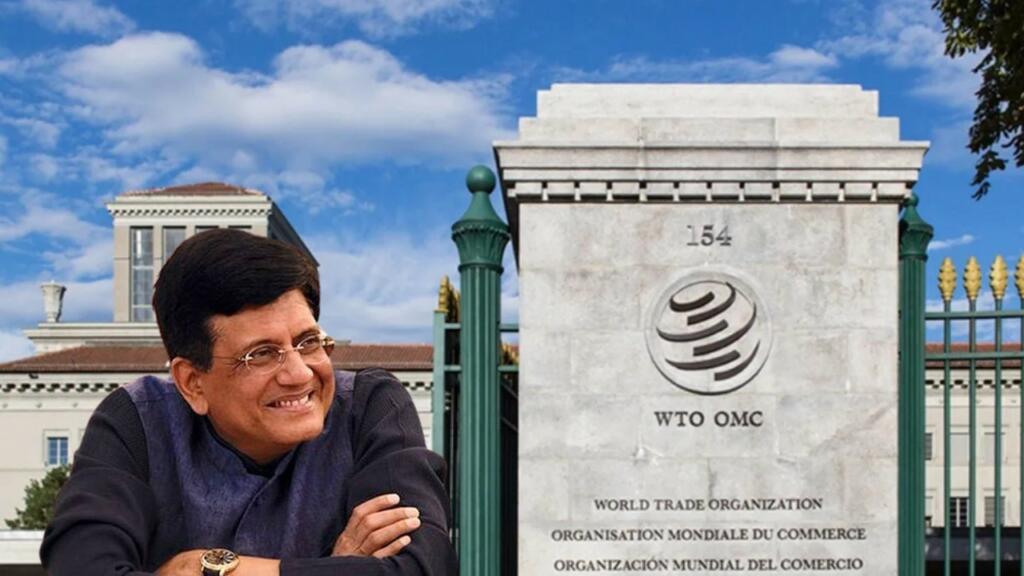For a very long time, India has been going back and forth on various trade issues affecting its permanent interests. The good thing about past negotiations is that India saved just enough leeway for itself to thrust its opinion when the right time arrives. Well, it has arrived. At the 12th Ministerial Meeting of WTO, Piyush Goyal is leading the charge of protecting our national interest.
Piyush Goyal stays firm
India’s Commerce Minister Piyush Goyal has made it crystal clear that the country is not going to buckle under any kind of pressure at the WTO. After attending a ministerial meeting of WTO, a coalition of developing countries, Goyal asserted, “No one can pressurise today’s ‘Aatmanirbhar Bharat‘. We can face any challenge. We don’t take any decision under pressure.”
Goyal took the stage to remind the world that India is taking everyone on board while simultaneously committed towards sustainable development goals. “We presented our stand while keeping in mind the fundamental principles of sustainable development goals. We raised the concern of developing and underdeveloped countries,” added Goyal
At the 12th Ministerial Conference of WTO, India is fighting for three main issues.
Read more: It’s time for India to show the WTO that humility is the prime virtue of a beggar
Farm subsidy
Farm subsidy is one of the biggest roadblocks hampering the coordination between developed and under-developed world. According to current WTO norms, India cannot provide farm subsidies beyond 10 % of the total monetary value of food produced. Additionally, WTO also asks these countries to not purchase grains from farmers at a minimum support price. India has continued both these practices by invoking a peace clause but there has to be a permanent solution to this problem.
India has suggested that the benchmark for the 10 per cent cap should be changed as it is 3 decades old and is now irrelevant. Emphasizing the need for change, Goyal said, “The current global food crisis is a reminder to us that we act now! Can we risk the lives of millions of people dependent on food stocks maintained for the poor and vulnerable?” He added that to rebuild trust and credibility among the countries, a permanent solution to the farm subsidy is imminent. Goyal’s assertion that WTO is losing its credibility is grounded in the fact that out of 125 countries, 82 are supporting India’s stand on the issue.
Fisheries subsidy
Fisheries subsidy has been a bone of contention for more than two decades. Geographical entities like China, the US and European Union have historically provided subsidies in the range of billions of dollars to their fisheries sector. Other countries like India also do it but their subsidy is substantially low. The increased subsidy has resulted in illegal, unreported and unregulated (IUU) fishing. Everyone agrees on the principle that it needs to be stopped. However, the solution of stopping fish subsidies is not digestible for India and other countries whose fishing sectors have not reached the zenith of their potential.
Developed countries have suggested on the lines of removing fisheries subsidies while India wants to protect subsidies for low-income, resource-poor fishermen. If WTO is allowed to have its way then developed countries will find it easier to fish in high-sea, while our fishermen will be deprived of even the basic government incentives like support for livelihood, motorisation of fishing boats, fuel rebates and infrastructure. India has rightly rejected these openly discriminatory proposals.
India’s solution is that developed nations should stop subsidizing their sectors for fishing beyond their Exclusive Economic Zone (EEZ) of 200 nautical miles for 25 years. This is based on the that the problem of IUU fishing has its roots in massive subsidies provided by big fishing nations. Speaking about the issue, Gajendra Navneet, India’s ambassador to WTO said, “This is a problem created by other countries and countries like India are being asked to take responsibility for the mess they have spread. India wants a safety net for fishermen because in a country like India, fishermen are not able to go fishing far in the water.”
Read more: Salute the rising sun, the only thing WTO needs to follow in case of India
TRIPS waiver
WTO also needs to decide whether it wants millions of people to die in case a covid-like pandemic again hits the planet. During the covid crisis, its TRIPS regime prevented a large number of poor nations from availing of early developed vaccines. Though that later turned out to be not much damaging as vaccines by Big pharma did not prove to be effective, no one knows what lies in future.
Read more: India creates vaccine to keep animals around the world Covid-free
India and South Africa have already pushed for TRIPS waiver and more than 100 countries have agreed to it. But, few countries claiming to be part of the ‘civilised world’ are not letting poor nations access the full extent of advancement in Science.
Everything now depends on the WTO. It has to decide whether supporting the hegemony of developed nations is a hill it is ready to die on. Alternatively, it can choose to stay in the game by listening to India’s appeal, which is to protect the interest of two-thirds of the world’s population.
Support TFI:
Support us to strengthen the ‘Right’ ideology of cultural nationalism by purchasing best quality garments from TFI-STORE.COM.
